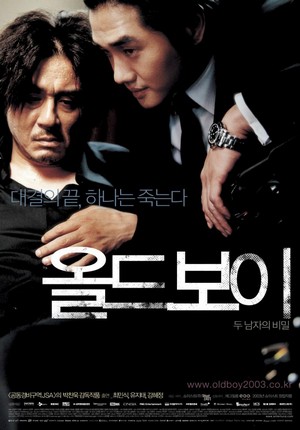
Oldeuboi (2003)
Oldboy / Old Boy / 올드보이

Raiting: ![]() 8,3 /10
8,3 /10
Genre: Drama
Director: Park Chan-wook
Stars: Choi Min-sik, Yoo Ji-tae and Kang Hye-jeong
Country: South Korea
Release date: 21 November 2003
Length: 120 minutes


Raiting: ![]() 8,3 /10
8,3 /10
Genre: Drama
Director: Park Chan-wook
Stars: Choi Min-sik, Yoo Ji-tae and Kang Hye-jeong
Country: South Korea
Release date: 21 November 2003
Length: 120 minutes